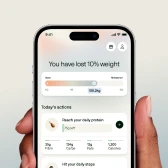Getting a good night’s sleep can change the entire way we approach the day.
From better concentration and focus to a more positive outlook, getting enough sleep is crucial.
There are a range of tools out there to help prioritise your sleep’s quality and length: apps, trackers and soft alarms to name but a few.
But how important is sleep really? Does it play a role in our weight loss journey? How much should we be getting? And how can we make sure we get enough of it?
This article will help determine how important sleep is and whether you’re getting enough.
Why is sleep important for weight loss?
Weight loss is a marathon and all of our journeys are completely unique.
One thing that we do have in common, though, is how critical sleep is to help us stay on track.
Studies have proven there’s a link between a lack of sleep and weight gain. When we’ve had a restless night’s sleep, we usually feel hungrier thanks to our bodies producing higher levels of ghrelin (a hunger hormone) and lower levels of leptin (a satiety hormone that helps to reduce our appetite).
When we’re sleep deprived, our insulin response is also impacted, so it takes longer to feel full when we’re eating. As a result, we eat more.
These findings show that, when we’re working toward sustained weight loss, we need to prioritise our sleep.
What’s the science behind sleep?
We doze off into a blissful sleep because of hormonal fluctuations which are driven by our circadian rhythm and sleep pressure.
Our body’s natural sleep-wake cycle is called our circadian rhythm, and it’s influenced by the light and darkness around you. We’re programmed to sleep at night due to the darkness sending a signal to our brains. That trigger tells our bodies to produce more melatonin, which hormonally rocks us to sleep like a baby.
Sleep pressure is our natural urge to sleep. Think of sleep pressure as a levelling bar. From the moment we wake up, our sleep pressure builds. Once we go to sleep, the levels decrease again, reaching a low point after a full night’s sleep.
Sleep is crucial because it influences the way we manage our emotions (there’s a reason we feel teary when we’re overtired!), cope with stress, physically heal from injuries, reboot our immune system, and presses the “reset” button on our hormones so that we can function properly every day.
What causes us to sleep badly?
A “bad” night’s sleep can be caused by a wide range of lifestyle factors, including:
- Consuming too much caffeine
- Experiencing jet lag
- Trying to cope with higher levels of stress
- Reduced movement or exercise levels
- Having unstable blood sugar levels
- Consuming alcohol
- Having too little exposure to natural light
- Being overstimulated (from phones, TVs, noise, conversation) too soon before bedtime
Your sleep requirements are unique to you
What you might define as a “good night’s sleep” may not be the same as someone else’s definition.
We’re all unique and, as such, we all need different amounts of sleep, have our own sleep-wake cycles and sleeping routines that work best for us as individuals.
Our chronotype describes our body’s preferred sleep-wake cycle and is determined by three main factors:
- Our genes
- Our age and development
- Our light exposure
Early birds have an early chronotype. If you’re an early bird, you’re much more productive first thing in the morning and when you go to bed early, too.
Night owls, on the other hand, have a late chronotype. If you naturally wake up later, go to bed later and find your productivity levels heighten further along in the day, you likely have a late chronotype.
Being able to pinpoint your chronotype helps you to work in sync with what your body is needing, allowing you to optimise your sleep schedule and routine and enhance your performance during the day.
Take action
It’s clear that the power of sleep shouldn’t be underestimated. From a more positive outlook on everyday life and having more energy to a more consistent approach to weight loss, it’s key to prioritise our sleep.
Reflect and try to determine if you feel you are getting enough sleep as an individual. If you’re struggling, ask yourself these questions:
- Do you feel you’re able to function at your best throughout the day?
- Do you set an alarm clock to wake you every morning? Without your alarm clock, would you oversleep excessively?
- Do you oversleep a considerable amount when you do not need to stick to your day-to-day routine? (EG: on weekends or holidays)
- Are you experiencing irritability or mood swings often?
- Do you feel you need to nap during the day?
- Do you rely on caffeine to help you get through the day without “crashing”? (EG: coffee, tea, fizzy drinks etc.)
If you have answered “yes” to the majority of these questions, it’s likely that you’re not getting enough sleep.
Never fear, though! In the next few articles, we’ll go through how to improve your sleep quality and duration by making a few day-to-day changes as well as adaptations to your bedtime routine.













